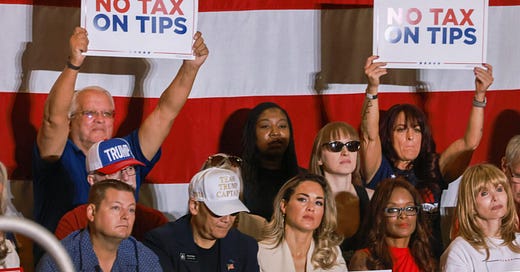I wrote an article a while ago opining on a common scam Republican politicians sell to the American people. Hey, there’s this vulnerable group of people, so let’s give them a tax break to help out.
Sounds reasonable enough, except at best it’s terrible policy, and at worst it’s highly regressive. Tipped employees are the focus of the week. Senate Democrats voted with Republicans to pass the ‘No Tax on Tips Act,' and I can only hope it fails to pass the House in exchange for more optimal and progressive tax policy.
So, why is it so bad to exempt taxes on tips? For starters, it creates a distortion in the tax code. The government, by favoring one type of income over another, creates an incentive for employees and employers to reclassify income as tips, whether the income comes from tips or not. This means the government has another statute it needs to search for and enforce, to the detriment of every single person who files their taxes and risks an increased probability of an audit.
The bill attempts to get around this by doing something obvious—making the reclassification of income in this way explicitly illegal. From the bill:
(1) IN GENERAL.—The term ‘qualified tip’ means any cash tip received by an individual in the course of such individual's employment in an occupation which traditionally and customarily received tips on or before December 31, 2023, as provided by the Secretary.
As with all tax law, I’m sure the Secretary of the Treasury will do a perfect job defining what employment ‘traditionally and customarily’ receives tips, and I’m also sure the tax planners of the world will operate in complete good faith when filing tax returns. I’m sure. Of course.
This bill also risk regressivity. A bill that makes tipped income exempt from taxes could result in, for example, a doctor classifying all of his or her income as ‘tips.’ The doctor, by getting away with this, could avoid a large portion (or the entirety) of his or her tax bill despite being a high-income earner.
The bill makes another clever attempt to get around this. Instead of saying tipped income isn’t taxed, it states the following:
(a) In general.—There shall be allowed as a deduction an amount equal to the qualified tips received during the taxable year that are included on statements furnished to the employer pursuant to section 6053(a).
“(b) Maximum deduction.—The deduction allowed by subsection (a) for any taxpayer for the taxable year shall not exceed $25,000.
So Congress, in an attempt to address regressivity problems, creates a new boosted standard deduction for tipped wages. This means even if a wealthy professional attempts to reclassify their income as tips to avoid taxes, they’re limited to a $25,000 deduction.
This brings me to the final problem. Why should poor workers making hourly, salaried, or any otherwise non-tipped wage, pay more in taxes than tipped workers? Let’s tell a tale of two workers, both earning $25,000, one through tips and one through an hourly wage.
The taxable income for the individual earning tips is $0 because they can deduct $25,000 from their taxable income. The taxable income for the hourly employee is $10,400 ($25,000 in income minus the current standard deduction of $14,600 for all filers).
The first tax rate in the tax bracket is 12%. This means the tipped worker owes $0 in taxes, and the hourly worker owes $1,248 in taxes, even though they make the same income, and even though, in the eyes of the logical policymaker, they are equally in need of help.
By attempting to help a vulnerable group of workers rather than all people in need, Congress proposes a distortionary tax code that taxes one type of low income earner more than another despite equal need between the two.
Congress should vote against this bill in favor of a higher standard deduction for all workers or establish a basic income through tax reform.




Infinite money glitch
Yes, I've been saying some of the same things on the X platform. Untaxing tips will give employers an incentive to steer what they pay their employee towards tips instead of salaries, which are taxed. Essentially, this means total income will "balance out" but will also become more uncertain, since tips vary by customer, whereas salaries are fixed. Will this mean better service from tipped employees where every customer is a payer? Maybe, but it may also lead to more stigmatizing certain kinds of customers who are less likely to be good tippers, perhaps poor people like those being tipped, or other groups yet to be imagined. It will lead to less accountability from the legal employer and more power form the tippers, who are unaccountable...unless Congress wants tippers to start keeping receipts from those they tipped to match to the tipped peoples' tax returns, which would create another logistical nightmare.